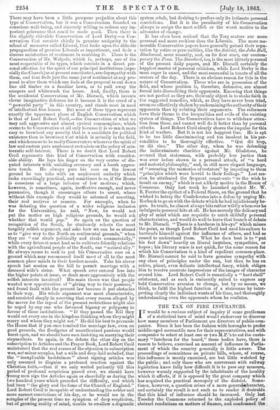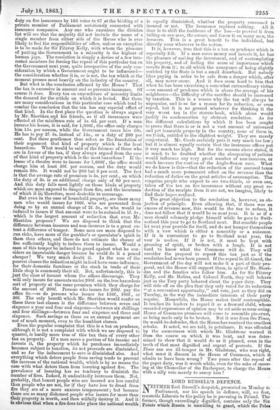THE TAX ON FIRE INSURANCES.
IT would be a curious subject of inquiry if some gentleman of a statistical turn of mind would endeavour to discover how many members of Parliament are directors of public com- panies. Since it has been the fashion with boroughs to prefer middle-aged mercantile men for their representatives, and with companies to select at least one or two M.P.'s to eat the custo- mary "luncheon for the board," these bodies have, there is reason to believe, exercised an amount of influence in Parlia- ment of which the country generally is little aware. The proceedings of committees on private bills, where, of course, this influence is mostly exercised, are but little watched by the public' and only those who are conversant with railway legislation know fully how difficult it is to pass any measure, however warmly supported by the inhabitants of the locality which it affects, if it is opposed by the great company which has acquired the practical monopoly of the district. Some- times, however, a question arises of a more generalscharacter, and certainly the result is not such as to render it desirable that this kind of influence should be increased. Only last Tuesday the Commons returned to the exploded policy of abstract resolutions on matters of finance, and condemned the duty on fire insurances by 103 votes to 67 at the bidding of a private member of Parliament notoriously connected with insurance companies. Any one who examines the division list will see that the majority did not include the name of a single member from either side of the House who is ever likely to Ted the responsibilities of office, unless an exception is to be made for Sir Fitzroy Kelly, with whom the pleasure of putting the Government in a minority is the highest of human joys. The resolution is simply a device of a few inte- rested members for forcing the repeal of this particular tax on the Government next year, quite irrespective of the only con- sideration by which a Government ought to be influenced-- the consideration whether it is, or is not, the tax which at the moment presses most heavily on the industry of the country.
But what is the conclusion affirmed by the Rouse? That the tax is excessive in amount and so prevents insurance. Of -course it does. Every tax on expenditure of necessity limits the demand for the article on which it is levied. But there are many considerations in this particular ease which tend to -combat the conclusion that the tax has any especial effect of that kind. In the first place the question is always argued by Mr. Sheridan and his friends, as if all insurances were effected at the minimum rate of is. 6d. per cent. If a man insures his house, it is said, for 1,000/., the office only charges him 15s. per annum, while the Government taxes him 30s. He has to pay 2/. 5s. instead of 15s., or a duty of 200 per -cent. But these gentlemen thus select as the foundation of their argument that kind of property which is the least hazardous. What would be said of the fairness of those who are in favour of the tax, if they always argued from the case -of that kind of property which is the most hazardous ? If the lessee of a theatre were to insure for 1,000/., the office would -charge him at least 50/. per annum, and the duty would remain 30s. It would not be 200 but 3 per cent. The fact is that the average rate of premium is 5s. per cent., on which the duty of 3s. is an additional charge only of 60 per cent. And this duty falls most lightly on those kinds of property which are most exposed to danger from fire, and the insurance -of which it is, therefore, most desirable to encourage.
But even in the case of household property, are there many men who would insure for 100/. who are prevented from doing so by an annual charge of 2/. 5s., or who would be induced to insure if that amount were to be reduced to 1/. 5s, which is the largest amount of reduction that even Mr. Sheridan proposes? We are disposed to think that the difference between insurers and non-insurers is to a great ex- tent a difference of temper. Some men are more disposed to run risks, have more of the gambler's or speculator's spirit in them than others, and these do not estimate the chance of fire sufficiently highly to induce them to insure. Would a man of this temper be induced to guard against what he con- siders an improbable danger because he could do it a pound cheaper? We very much doubt it. In the case of the poorest classes the reduction might indeed have some influence, for their domestic furniture or the stock in trade of their little shop is commonly their all. But, unfortunately, this is just the class of insurer whom the offices discourage. They will only insure for amounts under 2001. on the less hazardous sort of property at the same premium which they charge for the amount of 200/. Persons who insure for 2001. pay the office 38.—so do persons who insure for 150/., 100/., or 50/. The only benefit which Mr. Sheridan would confer on these three last classes is the difference between seven and .sixpence a year and four and sixpence—between six shillings and four shillings—between four and sixpence and three and sixpence. Such savings as these on an annual payment are not of much moment, even to the humblest classes.
Even the popular complaint that this is a tax on prudence, although it is not a complaint with which we are disposed to quarrel, is hardly more true of this tax than of every other tax on property. If a man saves a portion of his income and invests it, the property which he purchases immediately becomes subject to taxation, its net proceeds are diminished, and so far the inducement to save is diminished also. And ,everything which deters people from saving tends to prevent the increase of the national wealth, which is by no means the ease with what deters them from insuring against fire. The prevalence of insuring has no tendency to diminish the -number of fires. Indeed, it undoubtedly increases them. Not, probably, that honest people who are insured are less careful than people who are not, for if they have less to dread from fire they are of a more anxious temperament ; but because there are so many dishonest people who insure for more than their property is worth, and then wilfully destroy it. And it is obvious that when a fire does take place the national wealth is equally diminished, whether the property consumed is insured or not. The insurance replaces nothing. All it does is to shift the incidence of the loss—to prevent it from falling on one man, the owner, and throw it on many men, the insurers. This is a great benefit to the individual, but directly none whatever to the nation.
It is, however, true that this is a tax on prudence which is especially felt. If a man saves money and invests it, he has the pleasure of making the investment, and of contemplating his property, and of feeling the sense of importance which results from it ; to all which the annoyance of being slightly mulcted by the State is but a small drawback. But nobody likes paying in order to be safe from a danger which, after all, may never occur. And it does seem hard to him that when he has been exercising a somewhat extraordinary virtue —an amount of prudence which is above the average of his neighbours—the difficulty of the sacrifice should be increased by taxation. This is a reason why the tax will always be unpopular, and is so far a reason for its reduction, or even repeal, but it is no ground whatever for thinking it the very worst tax in the statute. book, which alone would justify its condemnation by abstract resolution. As for the different calculations by which it has been sought to prove that there is or is not a vast amount of uninsured and yet insurable property in the country, none of them is, we think, entitled to the slightest weight. They are merely conjectural. Mr. Coode certainly puts it very much too low ; but it is almost equally certain that the insurance offices put it very much too high. But for the reasons above stated, it is much to be doubted whether the cheapening of policies would influence any very great number of non-insurers, or much increase the caution of the Anglo-Saxon race. What we do know is this—that the reduction of the assessed taxes had a much more permanent effect on the revenue than the reduction of duties on the great articles of consumption. The sanguine people who expect to see two-thirds, or even one, taken off the tax on fire insurances without any great re- duction of the receipts from it are not, we imagine, likely to find their hopes realized.
The great objection to the resolution is, however, an ob- jection of principle. Even allowing that, if there was an excess of revenue now, this would be the tax to reduce, it does not follow that it would be so next year. It is as if a man should solemnly pledge himself while he goes to Swit- zerland this year to go to Scotland next. But sensible people let next year provide for itself, and do not hamper themselves with a vow which is either a nonentity or a nuisance. If it is convenient to go to Scotland next year, the vow is useless. If it is not, it must be kept with groaning of spirit, or broken with a laugh. It is not hard to know what the Commons will do. They will consider the proposal to repeal. this tax just as if the resolution had never been passed. If the repeal be ill-timed, the Government of the day will not make it a part of their pro- posal, and the House will support them, in spite of Mr. Sheri- dan and the fanatics who follow him. As for Sir Fitzroy Kelly, and Mr. Malins, and Colonel North, they will behave just as the Tory party behaved about the paper duty. They will ride off on the plea that they only voted for its reduction "at a convenient opportunity," and rote, just as they did on Tuesday, in the way the immediate interests of their party require. Meanwhile, the House makes itself contemptible. It teaches its leaders to regard it as a froward child, whose recorded expressions of opinion may be set aside as unmeaning. House of Commons promises will come to resemble pie-crust, as being made only to he broken. But it was from the Times, its would- be defender, that the House has received the cruellest rebuke. It acted, we are told, in petulance. It was offended by the earnestness with which Mr. Gladstone warned it from the course on which it was bent, and was deter- mined to show that it would do as it pleased, even in the teeth of that most dignified and cogent of protests. If the Times can see ill-temper in Mr. Gladstone, who was right, what must it discern in the House of Commons, which it admits to have been wrong ? Two years after the repeal of the paper duty, was it worth while, even for the sake of sneer- ing at the Chancellor of the Exchequer, to charge the House with a silly vote merely to annoy him ?































 Previous page
Previous page